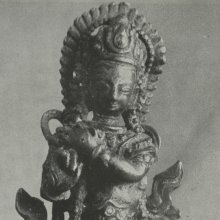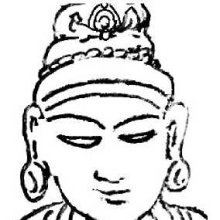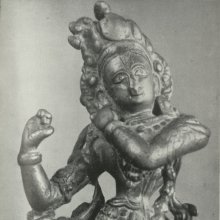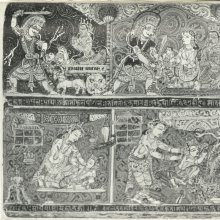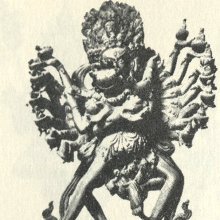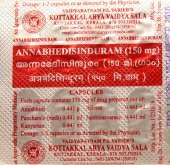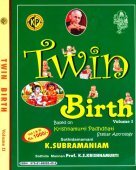K, Ḵ: 3 definitions
Introduction:
K means something in Hinduism, Sanskrit, Hindi, Tamil. If you want to know the exact meaning, history, etymology or English translation of this term then check out the descriptions on this page. Add your comment or reference to a book if you want to contribute to this summary article.
Images (photo gallery)
(+30 more images available)
In Hinduism
Vyakarana (Sanskrit grammar)
Source: Wikisource: A dictionary of Sanskrit grammarK (क्).—(l) the consonant क् (k); the first con. sonant of the consonant group as also of the guttural group; (2) substitute क् (k) for consonants ष् (ṣ), and ढ् (ḍh) before the consonant स् (s);cf.V.P.2.41. For the elision (लोप (lopa)) of क् (k) on account of its being termed इत् (it) see P.I.3.3 and 8.

Vyakarana (व्याकरण, vyākaraṇa) refers to Sanskrit grammar and represents one of the six additional sciences (vedanga) to be studied along with the Vedas. Vyakarana concerns itself with the rules of Sanskrit grammar and linguistic analysis in order to establish the correct context of words and sentences.
Languages of India and abroad
Sanskrit dictionary
Source: DDSA: The practical Sanskrit-English dictionaryK (क्).—The first consonant of the alphabet, and first letter of the guttural class (ka varga).
--- OR ---
K (क्).—Jivhāmūlīya letter occurring before the guttural क् (k) or ख् (kh) and written as ( k, kh). प् (p) Upadhmānīya letter occurring before the labial प् (p) or फ् (ph) and written also ( p, ph); These are called अर्धविसर्ग (ardhavisarga). of dry medicinal billets चूर्ण (cūrṇa). (3) Decoction of medicinal herbs (kaṣāya). (4) Decoction mixed with medicinal powder (avaleha). (5) A medicine to be pounded like condiment (kalka). -पञ्चामृतं गुडूची, गोक्षुर, मुसली, मुण्डी, शतावरी (pañcāmṛtaṃ guḍūcī, gokṣura, musalī, muṇḍī, śatāvarī).
-pratinidhiḥ A substitute for a herb which cannot be secured.
Sanskrit, also spelled संस्कृतम् (saṃskṛtam), is an ancient language of India commonly seen as the grandmother of the Indo-European language family (even English!). Closely allied with Prakrit and Pali, Sanskrit is more exhaustive in both grammar and terms and has the most extensive collection of literature in the world, greatly surpassing its sister-languages Greek and Latin.
Hindi dictionary
Source: DDSA: A practical Hindi-English dictionaryK in Hindi refers in English to:——the first consonant and the first member of the first pentad (i.e. [kavarga]) of the Devnagri: alphabet: —[kha ga] alphabet; ABC, rudiments of any subject; •[janana] to know the ABC (of any subject)..—k (क) is alternatively transliterated as Ka.
...
See also (Relevant definitions)
Starts with (+9980): Jhampalisu, K-tarani, Ka, Ka bella, Ka bombo, Ka bontila, Ka buea, Ka Caṇmukacuntaram, Ka chang ma, Ka chaplak, Ka dam pa i me tog, Ka dam pai me tog, Ka dambakata, Ka dao, Ka don, Ka don nam, Ka don noy, Ka ka dz mbu, Ka ka dza gi, Ka ke da.
Ends with (+4011): Aa aook mook, Aabrarak, Aachak, Aainu-ddik, Aainuddek, Aainuddik, Aak, Aakhetak, Aalaapak, Aangba mendok, Aangik, Aank, Aantarik, Aapatik, Aapraadhik, Aarqe-bede-mushk, Aatmarakshak, Abaddhavak, Abarkasa-dek, Abee-adrak.
Full-text (+10137): Abjadrish, Apathyabhuj, Svapnaj, Kshmabhuj, Durabhaj, Aytam, Atishaktibhaj, Murraytam, Makili-k-kirai, Asrij, Kasina, Kuppipoovu, Tharana, Ka, Pumvatsa, Jivanti, Ardhavisarga, Kayakammannata, Aytakkurukkam, Kakara.
Relevant text
One of your search terms exceeds the minimun character amount per search term. This amount currently equals 2.
No search results for K, Ḵ in any book or story.
Related products
(+23 more products available)
